Discography
Private recordings
as a baritone
Paris, 19 September 1947; piano: Thelma Johannes; 10", 78 rpm
See where young love (Robert Fleming)
Love, like a drop of dew (Robert Fleming)/Du bist wie eine Blume (Schumann)
Paris, 6 February 1948; piano: Thelma Johannes; 10", 78 rpm
Après un rêve (Fauré)
Eleanore (Mallinson)
as a tenor
Paris, 19 August 1957; piano: Simone Tilliard; 7", 45 rpm
Die Meistersinger von Nürnberg (Wagner): Morgenlich leuchtend
Indian love lyrics (Woodforde-Finden): Till I wake
Paris, 29 August 1957; piano: Simone Tilliard; 7", 33 rpm
Carmen (Bizet): La fleur que tu m'avais jetée/
La damnation de Faust (Berlioz): Nature immense
La reine de Saba (Gounod): Inspirez-moi, race divine
TV film
French National Television, November 1964
Otello (complete)
with Hélia T'Hézan, Jean-Pierre Laffage, André Mallabréra, Robert Andreozzi,
Robert Geay, Yves Bisson, Andrée Gabriel; Georges Derveaux (conductor)
Live recordings
Laon, Église Saint-Jean-Baptiste de Vaux, 18 September 1971; piano: Louise Delisle; in-house recording
1. Silent worship (Händel/Somerwell)
2. The self-banished (Blow)
3. It was a lover and his lass (Morley)
4. Die Winterreise (Schubert): Die Post
5. Die Winterreise (Schubert): Das Wirtshaus
6. Die Winterreise (Schubert): Die Krähe
7. Les berceaux (Fauré)
8. Après un rêve (Fauré)
9. Soir (Fauré)
10. Samson et Dalila (Saint-Saëns): Vois ma misère, hélas
11. La damnation de Faust (Berlioz): Nature immense
12. Turandot (Puccini): Nessun dorma
13. Die Meistersinger von Nürnberg (Wagner): Morgenlich leuchtend
14. Lohengrin (Wagner): Atmest du nicht mit mir
15. Lohengrin (Wagner): In fernem Land
16. Otello (Verdi): Niun mi tema
17. Sleep (Warlock)
18. Mon âme à ton cœur s’est donnée (Eric-Paul Stekel)
19. Indian love lyrics (Woodforde-Finden): Till I wake
20. Star of me (James H. Rogers)
encores:
21. Star of me (James H. Rogers), once again
22. Otello (Verdi): Niun mi tema, once again
Saint-Quentin, 27 January 1980; piano: Mary Dibbern; in-house recording
Joint concert with contralto Régine Rossy; Harper sang:
1. The self-banished (Blow)
2. Since first I saw your face (Thomas Ford)
3. Silent worship (Händel/Somerwell)
4. Die Winterreise (Schubert): Die Post
5. Die Winterreise (Schubert): Die Krähe
6. Die Winterreise (Schubert): Das Wirtshaus
7. Die Winterreise (Schubert): Mut
8. Fidelio (Beethoven): Gott, welch Dunkel hier
9. Samson et Dalila (Saint-Saëns): Mon coeur s'ouvre à ta voix
(supporting Régine Rossy)
10. Otello (Verdi): Ora e per sempre addio
11. Otello (Verdi): Dio, mi potevi scagliar
12. Otello (Verdi): Niun mi tema
Norman Harper and the Ring... no, not Wagner's... Rubinstein's Ring!
Norman Harper's wife Nora was a fashion journalist, and she knew Helena Rubinstein from several interviews; they became
dinner friends. At one such occasion, when Norman Harper and his wife (or rather, in this specific case, Nora Martin and her
husband) were invited to Rubinstein's posh Paris address on Île Saint-Louis, table talk was about Harper's Otello
costume. Helena Rubinstein reached into one of her jewelry boxes, and presented Harper with a 19th-century gold ring, stating that
it would fit his costume perfectly. From that day on, Norman Harper always wore that ring on stage when singing Otello.
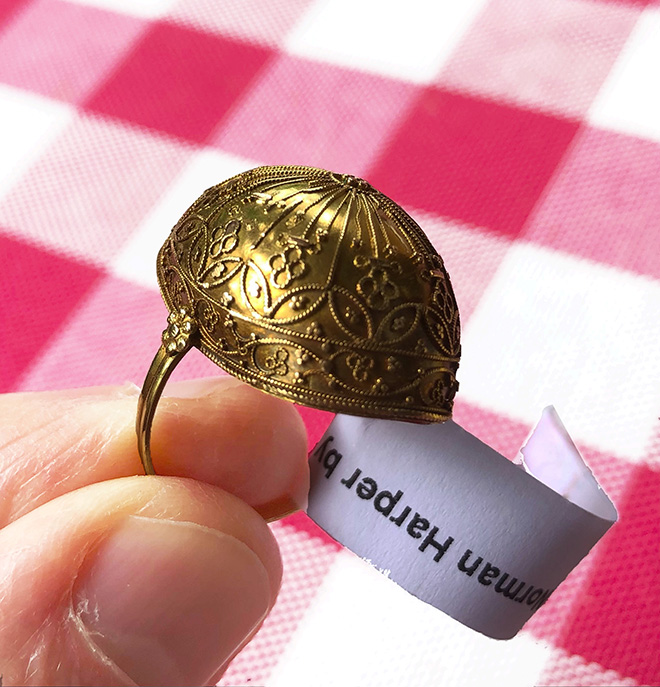
...and the anecdote about Otello's dagger
During one performance of Otello, while singing the final scene, Harper discovered that his dagger (the one pictured below) had
somehow slipped off his belt. Thus he spontaneously altered the acting and sang "Niun mi tema" on his knees, secretly groping
around the floor near Desdemona's bed that he was leaning on, trying to find something with which he could end his life. Just in
time, he found his dagger under the bed.
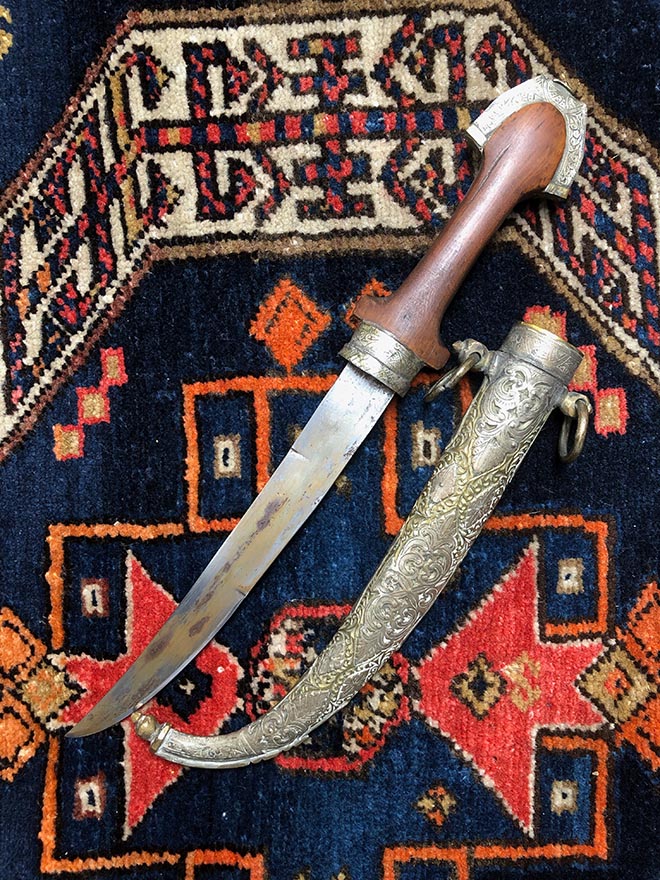
|
Career summary
Note: It would seem that Harper never sang opera in his baritone period.
The following is a somewhat comprehensive list of Norman Harper's performances, together with the casts:
Aida (Radamès)
- Dijon, March 1966. Géry Brunin (Aida), Jean Rallo (Il re); unspecified roles: Michèle Vilma, Felix Giband, René Salsoni.
- Atlanta, August 1967 (2 performances). Ella Lee (Aida), Andres Poulimenos (Il re), William Walker (Amonasro), Edward White (Ramfis), Carol Smith (Amneris), Gideon Grau (conductor).
Fidelio (Florestan)
- Nantes, February 1967 (3 performances). Lyne Cumia (Leonore), René Bianco (Don Pizarro), René Gauthier (Don Fernando), Nadine Sautereau (Marzelline), André Simon (Jaquino), Jean Delbésio (Erster Gefangener), Tony Terzy (Zweiter Gefangener), Lajos Soltesz (conductor).
Guillaume Tell (Arnold)
The casts are given in the following order: Mathilde (s), Ruodi (t), Guillaume (b), Walter (bs), Gessler (bs), conductor.
- Rennes, 28 February 1962. Monique de Pondeau, André Simon, Pierre Nougaro, Louis Maurin, Albert Dagnant, Jean Lapierre.
- Besançon, 14 March 1963. No cast available.
- Bournemouth, Welsh National Opera Company, 17 May 1963. Glenys Dowdle, David Hillman, Ronald Lewis, Gerwyn Morgan, Bryan Drake, Charles Groves.
- Llandudno, Welsh National Opera Company, 21 August 1963, Glenys Dowdle, David Hillman, Ronald Lewis, Gerwyn Morgan, Evan Thomas, Bryan Balkwill.
- Cardiff, October 1963 (2 performances). No cast available.
- Mons, Royal, 12 March 1967, Marie Petrignani, Louis Beghin, Gilbert Dubuc, Christian Portanier, Pierre Fischer, Jean Schmits.
La damnation de Faust (Faust)
- Lille, March 1964 (2 performances). Margaret Mas (Marguerite), Gérard Serkoyan (Mephistophélès), Henri Médus (Brander), Gustave Cloëz (conductor).
Lohengrin (title role)
- Bournemouth, May 1963. Richard Rees (Heerrufer), Derick Davies (König Heinrich), Russell Cooper (Telramund), Patricia Bartlett (Ortrud), Rita Hunter (Elsa), David Harding, Frank Evans, Vivian Davies, Cecil Bridge (Brabantische Edle), Sylvia Neate, Rosemary Thomas, Julia Crookes, Mair Watkins (Edelknaben), Charles Groves (conductor).
- Llandudno, Wales, August 1963. Richard Rees (Heerrufer), John Holmes (König Heinrich), Russell Cooper (Telramund), Patricia Bartlett (Ortrud), Pauline Tinsley (Elsa), David Harding, Benjamin James, Vivian Davies, Cecil Bridge (Brabantische Edle), Sylvia Neate, Rosemary Morris, Anne Griffiths, Mair Watkins (Edelknaben), Charles Groves (conductor).
- Grenoble, May 1965 (concert performance). Claude Vierne (Elsa), Andrée Camilleri (Ortrud), Eric-Paul Stekel (conductor).
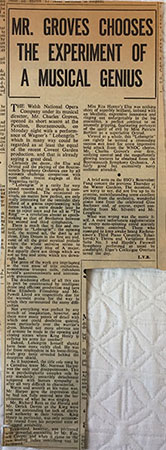 |
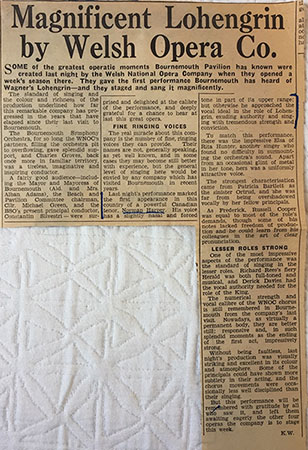 |
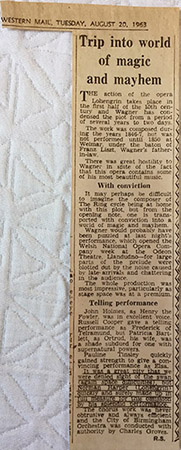 |
| Three reviews on Harper's Welsh Lohengrin performances (click on each picture to
enlarge). The first one is hilarious: "Lohengrin" is a rarity for very sound
reasons and its neglect is completely justified. |
Otello (title role)
The casts are given in the following order: Desdemona, Iago, Cassio, Roderigo, Lodovico, Montano, Emilia, conductor.
- Toronto, October 1960 (2 performances). Ilona Kombrink, Louis Quilico, Phil Stark, Wallace Williamson, Osyp Hoshuliak, Cornelis Opthof, Elsie Sawchuk, Ernesto Barbini.
- Rennes, January 1962. Iréne Jaumillot, Denis Poujol, Claude Rozenn, André Simon, Maurice Bougeat, Jean-Louis Elie, Jean Milhau, Jean Lapierre.
- Metz, October 1962. Christiane Stutzmann, Gilbert Dubuc, André Dran, Olivier Patras, Christian Dupuy, Charles Tyssandier, Paulette Simard, Jean-Claude Hartemann.
- Avignon, December 1963 (2 performances). Hélia T'Hézan, René Bianco, Roland Cougé, Vincent Costosi, Raymond Armond, Georges Chevalier, Pierrette Thévenon, Paul Etuin.
- Grenoble, December 1963 (2 performances). Hélia T'Hézan, René Bianco, Rémy Corazza, ?, ?, ?, Pierrette Thévenon, ? (possibly Eric-Paul Stekel).
- Lille, January 1964. Jacqueline Brumaire, Henry Peyrottes, René Damiro, Alexandre Calvani, Pierre Fischer, Claude Cétin, Jane Lamour, Gustave Cloëz.
- French National Television, November 1964. Hélia T'Hézan, Jean-Pierre Laffage,
André Mallabréra, Robert Andreozzi, Robert Geay, Yves Bisson, Andrée Gabriel, Georges Derveaux.
- Avignon, January 1965. Hélia T'Hézan, Julien Haas, Roland Cougé, Vincent Costasi, Adrien Sénéquier, Georges Chevalier, Edith Jacques, Paul Ethuin.
- Verviers, March 1965. No cast available.
- Liége, April 1965. Michèle Lebris, René Bianco, Aldo Margiotta, Fred Bieron, Jean Willems, Armand Mastro, Renée Janne, Marcel Desiron.
- Charleroi, October 1965. Yvette Perrin, Gilbert Dubuc, Jacques Urbain, Pol Trempont, Pierre Fischer, Roger Debecker, Iréne Schellekens, René Defossez.
- Liége, December 1965. Yvette Perrin, Gilbert Dubuc, Jacques Urbain, Pol Trempont, Pierre Fischer, Roger Debecker, Iréne Schellekens, René Defossez.
- Saint Etienne, January 1966. Christiane Stutzmann, Michel Dens, André Dran, ?, ?, ?, Pierrette Thévenon, Robert Herbay.
- Reims, February 1966. Nadia Granor, Jean Rallo, Roland Cougé, ?, ?, ?, Paulette Simard, Pierre Cruchon.
- Dijon, January 1967. Yvette Perrin, Jean-Pierre Lafage, Robert Delattre, ?, Simone Libor, Jean Brebion.
- Nantes, February 1967. No cast available.
- Rennes, February, 1967. No cast available.
- Bayonne, April 1967. Nadia Granor, Henry Peyrottes, Michel Cadiou, J.-L. Bacqué, Paul Grosjean, Jean Lainé, (J.-L. Elie?), Simone Couderc, Pierre-Michel Leconte.
- Tourcoing, March 1970. Odette Clerget, Lucien Cattin, F. Pureur, Michel Berger, Jack George, A. Vanglabeck, Nicole Oxombre, Michel Debels.
Samson et Dalila (Samson)
- Nantes, December 1965. Simone Couderc (Dalila), René Bianco (Le Grand Prêtre), Felix Giband (Viellard Hébreux), Jean-Louis Bacque (Abimélech), Tony Terzi (Premier Philistin), René Gauthier (Deuxième Philistin), Jean Delbésio (Messager), Jacques Juzeau (conductor).
- Reims, December 1966. Michèle Vilma (Dalila), Alain Fondary (Le Grand Prêtre), René Lanier (Vieillard Hébreux), Pierre Daguier (Messager), Jacques Coquier (Premier Philistin), Pierre Marret (Deuxième Philistin), Pierre Cruchon (conductor).
Turandot (Calaf)
- Liège, February 1965 (3 performances). Géri Brunin (Turandot), Agnès Leger (Liù), Germain Ghislain (Timur), Lucian Cattin (Ping), Peyo Garazi (Pong), Fred Bieron (Pang), Armand Mastro (Mandarin), Jacques Taelman (Altoum), Marcel Désiron (conductor).
- Charleroi, April 1965 (2 performances). Gèri Brunin (Turandot), Yvette Perrin (Liù), Germain Ghislain (Timur), Roger Debecker (Mandarin), Robert Mathieu (Altoum), Richard Demoulin (Ping), Stany Bert (Pong), Pol Trempont (Pang), Maurice Bastin (conductor).
| This is a spectacular upload, and definitely some of the rarest
material ever presented on Historical Tenors. Norman Harper was, by those few collectors who still remembered him, thought to never have
recorded, and in fact, no recording of his voice has ever been issued commercially.
We owe everything on this page to Matthew Sampson, who was a close friend of Norman Harper and his wife, and much their junior (he
called them his "European parents"). After Nora von Würtzler's death in 1998, he inherited the entire artistic estate of
Norman Harper, an incredible wealth of photos, documents, playbills – and the privately made records that captured Harper's
voice, first as a baritone, then as a tenor still in training (the private tenor recordings were made well before his tenor debut).
Plus Mr. Sampson had got, while she was still alive, another treasure from Nora von Würtzler: a video tape with the only
professional recording ever made of Harper, the complete Otello filmed by French Television in 1964. All these testimonies of
Harper's voice were most probably already unique when Mr. Sampson contacted me: von Würtzler had obtained the Otello tape,
with considerable difficulty, from French TV after Norman Harper's death (and copied it for Mr. Sampson); whether or not French TV
still keeps that recording in their archives, is highly doubtful. Of the first of the private discs (the one made on September 19th,
1947), two copies had survived in Harper's (and hence in Sampson's) possession; of the others, just one each. Harper had of
course distributed a few copies of those discs among friends and agents, but again, it's highly doubtful whether any of those other
copies is still alive and well.
Turning to Norman Harper, the singer, it's first of all evident that he was a remarkable interpreter: he never bores, not even in
the blandest of lieder repertory (obviously his standard fare in his baritone days). Some of the early private tenor discs
may raise the question whether he did himself and his voice a favour when abandoning the baritone range (in which he is definitely
more at ease) and conquering tenor territory. His upper register is somewhat detached from the rest of his voice, and not always easy,
with a tendency to sounds that range from nasal to pinched, to biting and even throaty (cf. the Meistersinger or the Reine de Saba
recordings). Problems that were particularly evident also in the last years of his career, when he had abandoned the operatic
stage and returned to the concert podium.
On the other hand, the recordings of the Flower Song and the Woodforde-Finden lied are flawless, and the Nature immense is
very good. And then there is, above all, that Otello TV film – and it proves that it was with good reason that Harper was in
considerable demand for his Otello. He was an Otello of commanding presence, in total control of his (powerful) vocal means, no
significant strain, even some successful pianos (which is of course a difficult task for muscular voices like Harper's)... plus the
captivating interpretation that we might expect from Harper. In short: definitely worth hearing, and it's a pity that this
excellent recording (the other leads are good, too, and Hélia T'Hézan is even fantastic) has never been issued
commercially.
The live recordings
The last thing so far that resurfaced from Norman Harper's career are the complete in-house recordings of two of his live concerts.
One of them is his very last concert, Saint-Quentin 1980: a concert that doesn't add anything to our knowledge of Norman Harper,
just to our – already sufficiently vast – knowledge of singers who have missed the right moment to retire. I'm not
going to publish anything from that recording.
However, the other concert, Laon 1971, is absolutely worth hearing, and confirms again that after finishing his (second) turn of studies,
Harper became a full-fleshed tenor. Large parts of that concert are actually impressive (Baroque and Renaissance music aside, where
he was simply not at home), and I'm presenting ten selections from that evening. They prove that Harper was a great Schubert singer,
they include another excellent Nature immense, and after hearing the two Lohengrin excerpts – albeit his German
diction leaves a lot to be desired – it must be regretted that we don't have more of him in that role.
 Eric-Paul Stekel picture, with dedication to Norman Harper
Eric-Paul Stekel picture, with dedication to Norman Harper
One selection deserves special mention: Eric-Paul Stekel (1898–1978) was an Austrian viola player, conductor and composer.
Being Jewish, he sought refuge from the Nazis in France and Algeria. From 1952 to his death, he was the dominant figure in the music
scene of Grenoble (head of the conservatory, founder and head of the symphony orchestra); for details on his collaboration with
Norman Harper, please see the above biography. The lied sung by Harper and presented here would seem to be the only recording of any
composition by Stekel.
|
|
| Norman Harper sings | Die Winterreise: Die Post
|
| Norman Harper sings | Die Winterreise: Die Krähe
|
|
Norman Harper as a baritone
Infinite thanks to Matthew Sampson for the recordings, the biography, the career summary, the ring and dagger stories
& pictures, the Stekel picture, and the reviews.
|





